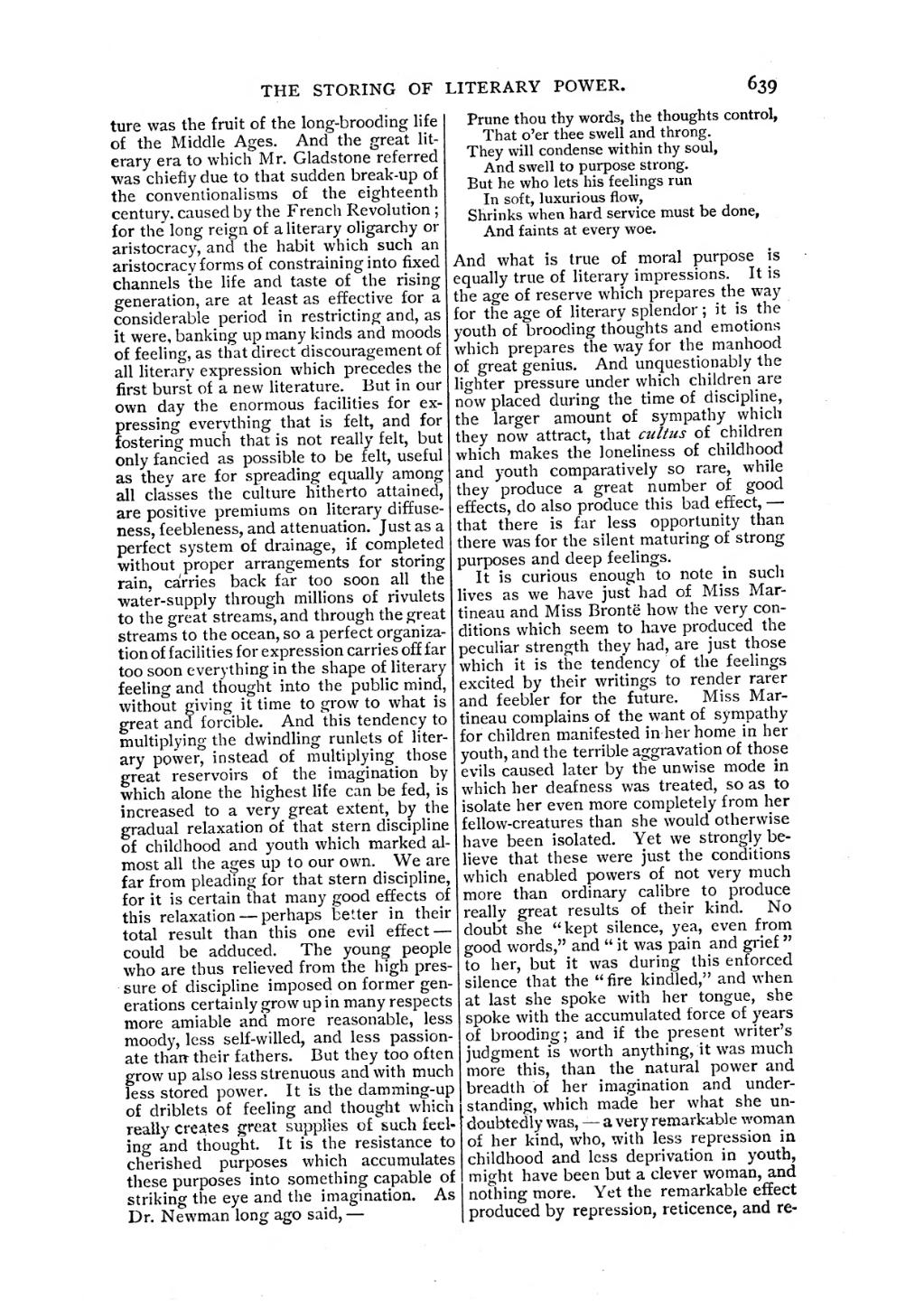ture was the fruit of the long-brooding life of the Middle Ages. And the great literary era to which Mr. Gladstone referred was chiefly due to that sudden break-up of the conventionalisms of the eighteenth century, caused by the French Revolution; for the long reign of a literary oligarchy or aristocracy, and the habit which such an aristocracy forms of constraining into fixed channels the life and taste of the rising generation, are at least as effective for a considerable period in restricting and, as it were, banking up many kinds and moods of feeling, as that direct discouragement of all literary expression which precedes the first burst of a new literature. But in our own day the enormous facilities for expressing everything that is felt, and for fostering much that is not really felt, but only fancied as possible to be felt, useful as they are for spreading equally among all classes the culture hitherto attained, are positive premiums on literary diffuseness, feebleness, and attenuation. Just as a perfect system of drainage, if completed without proper arrangements for storing rain, carries back far too soon all the water-supply through millions of rivulets to the great streams, and through the great streams to the ocean, so a perfect organization of facilities for expression carries off far too soon everything in the shape of literary feeling and thought into the public mind, without giving it time to grow to what is great and forcible. And this tendency to multiplying the dwindling runlets of literary power, instead of multiplying those great reservoirs of the imagination by which alone the highest life can be fed, is increased to a very great extent, by the gradual relaxation of that stern discipline of childhood and youth which marked almost all the ages up to our own. We are far from pleading for that stern discipline, for it is certain that many good effects of this relaxation — perhaps better in their total result than this one evil effect — could be adduced. The young people who are thus relieved from the high pressure of discipline imposed on former generations certainly grow up in many respects more amiable and more reasonable, less moody, less self-willed, and less passionate than their fathers. But they too often grow up also less strenuous and with much less stored power. It is the damming-up of driblets of feeling and thought which really creates great supplies of such feeling and thought. It is the resistance to cherished purposes which accumulates these purposes into something capable of striking the eye and the imagination. As Dr. Newman long ago said, —
Prune thou thy words, the thoughts control,
That o'er thee swell and throng.
They will condense within thy soul,
And swell to purpose strong.
But he who lets his feelings run
In soft, luxurious flow,
Shrinks when hard service must be done,
And faints at every woe.
And what is true of moral purpose is equally true of literary impressions. It is the age of reserve which prepares the way for the age of literary splendor; it is the youth of brooding thoughts and emotions which prepares the way for the manhood of great genius. And unquestionably the lighter pressure under which children are now placed during the time of discipline, the larger amount of sympathy which they now attract, that cultus of children which makes the loneliness of childhood and youth comparatively so rare, while they produce a great number of good effects, do also produce this bad effect, — that there is far less opportunity than there was for the silent maturing of strong purposes and deep feelings.
It is curious enough to note in such lives as we have just had of Miss Martineau and Miss Brontë how the very conditions which seem to have produced the peculiar strength they had, are just those which it is the tendency of the feelings excited by their writings to render rarer and feebler for the future. Miss Martineau complains of the want of sympathy for children manifested in her home in her youth, and the terrible aggravation of those evils caused later by the unwise mode in which her deafness was treated, so as to isolate her even more completely from her fellow-creatures than she would otherwise have been isolated. Yet we strongly believe that these were just the conditions which enabled powers of not very much more than ordinary calibre to produce really great results of their kind. No doubt she "kept silence, yea, even from good words," and "it was pain and grief" to her, but it was during this enforced silence that the "fire kindled," and when at last she spoke with her tongue, she spoke with the accumulated force of years of brooding; and if the present writer's judgment is worth anything, it was much more this, than the natural power and breadth of her imagination and understanding, which made her what she undoubtedly was, — a very remarkable woman of her kind, who, with less repression in childhood and less deprivation in youth, might have been but a clever woman, and nothing more. Yet the remarkable effect produced by repression, reticence, and re-
